Summer often offers capacity for reflection and planning ahead. As we head into the last few weeks of spring term, we want to highlight what our colleagues from around campus are reading. Perhaps you’ll find your next summer read in the list!
We asked colleagues, “What have you read that has informed your work or resonated for you, and why? This can be reading in any form (e.g., books, articles, videos, podcasts, audiobooks, etc.)”
Liz Delf, Senior Instructor, School of Writing, Literature, and Film
You’re Not Listening: What You’re Missing and Why It Matters by Kate Murphy (Valley Library; Macmillan Publishers)
 Oh man, listening is hard. I am a talker! But this book convinced me that it’s worth making the effort to listen more. Murphy argues for the value of listening in relationships, friendships, workplaces, and interactions with strangers… even when you disagree. While this is a valuable area for me to improve on as a faculty member, it also made me think about how to help students listen to a range of ideas and perspectives. Surprisingly varied and enjoyable read.
Oh man, listening is hard. I am a talker! But this book convinced me that it’s worth making the effort to listen more. Murphy argues for the value of listening in relationships, friendships, workplaces, and interactions with strangers… even when you disagree. While this is a valuable area for me to improve on as a faculty member, it also made me think about how to help students listen to a range of ideas and perspectives. Surprisingly varied and enjoyable read.
Know My Name by Chanel Miller (Valley Library; Penguin Random House)
Miller’s memoir of her assault by Brock Turner and the consequent trial is 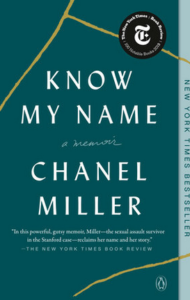 painful—but it is also nuanced, poetic, and powerful. Her insightful close readings of court transcripts are rage-inducing. It’s a fair and important critique of the institutions—including the university—that should have done more in the aftermath of the assault. Miller also lifts up the helpers. The nurses, the advocates, the detectives, the DA, her family. The thousands who wrote to her when her victim’s statement was published. The cyclists who stopped Turner and chased him down. An important story for all of us to hear.
painful—but it is also nuanced, poetic, and powerful. Her insightful close readings of court transcripts are rage-inducing. It’s a fair and important critique of the institutions—including the university—that should have done more in the aftermath of the assault. Miller also lifts up the helpers. The nurses, the advocates, the detectives, the DA, her family. The thousands who wrote to her when her victim’s statement was published. The cyclists who stopped Turner and chased him down. An important story for all of us to hear.
Miguel Arellano, Assistant Director of Outreach, Office of Institution Diversity
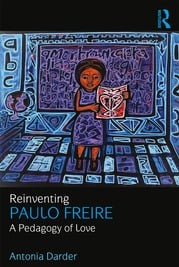 Reinventing Paulo Freire: A Pedagogy of Love by Antonia Darder (Valley Library; Routledge)
Reinventing Paulo Freire: A Pedagogy of Love by Antonia Darder (Valley Library; Routledge)
Caring Democracy: Markets, Equality, and Justice by Joan Tronto (Valley Library; NYU Press)
Some central concepts are unmasking power structures and dominant values that tend to dehumanize people and limit our full potential, individual and collectively, and how we can start shifting our values and practice to create a world that is more just and caring. These books make us consider how care and love (defined as a verb) can be central to our work with students and larger society. P.S. Tronto provides a framework for us!
Funmi Amobi, Instructional Consultant, College Liaison, Center for Teaching and Learning
Ungrading: Why Rating Students Undermines Learning (and What to Do Instead) edited by Susan Blum (Valley Library; West Virginia University Press)
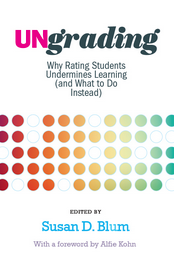 The pandemic brought new attention to an assessment culture that focuses on assessment as learning and for learning, not just as summative measurement of student learning. The accountability paradigm of assessment with its emphasis on using grades to measure student knowledge and ability came under scrutiny. The learning-centric focus of the meaning assessment gained prominence. In Ungrading: Why Rating Students Undermines Learning (and What to Do Instead), edited by Susan Blum, the contributors unequivocally identified grades as the real problem in the assessment of student learning. They advocated for qualitative rather than quantitative assessment of student learning.
The pandemic brought new attention to an assessment culture that focuses on assessment as learning and for learning, not just as summative measurement of student learning. The accountability paradigm of assessment with its emphasis on using grades to measure student knowledge and ability came under scrutiny. The learning-centric focus of the meaning assessment gained prominence. In Ungrading: Why Rating Students Undermines Learning (and What to Do Instead), edited by Susan Blum, the contributors unequivocally identified grades as the real problem in the assessment of student learning. They advocated for qualitative rather than quantitative assessment of student learning.
Steve Weber, Coordinator of Circulation Services, Library Experience + Access Department (LEAD), Valley Library
That’s Not How We Do It Here!: A Story about How Organizations Rise, Fall—and Can Rise Again by John P. Kotter & Holger Rathgeber (Valley Library; Kotter Inc.)
That an organization needs both innovation 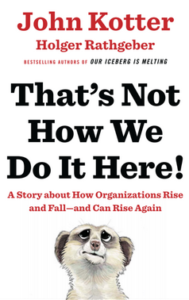 and structure to succeed over the long run isn’t novel. However, it isn’t unusual for someone to have an affinity for one approach and a mistrust for the other. Having the concepts presented as a fable made for an enjoyable listen on my commute and suggested new ways to explain why one approach needs the other to thrive to colleagues who might respond better to analogy than charts and graphs.
and structure to succeed over the long run isn’t novel. However, it isn’t unusual for someone to have an affinity for one approach and a mistrust for the other. Having the concepts presented as a fable made for an enjoyable listen on my commute and suggested new ways to explain why one approach needs the other to thrive to colleagues who might respond better to analogy than charts and graphs.
Marigold Holmes, Assistant Director for Sponsored Programs, Office of International Services
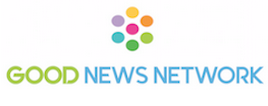 The Good News Network highlights positive stories from around the world. As an international educator, knowing about political unrest, economic turmoil, natural disasters, etc. is important to offering timely and nuanced support to those I serve. But all too often, people in crisis get defined by the crisis, and I have found that knowing and appreciating the positive stories are equally important, especially in preserving their dignity. At a time when the news is overwhelmingly negative, this site offers a balanced view, reminding us that there is much good in the world and hope for a brighter future.
The Good News Network highlights positive stories from around the world. As an international educator, knowing about political unrest, economic turmoil, natural disasters, etc. is important to offering timely and nuanced support to those I serve. But all too often, people in crisis get defined by the crisis, and I have found that knowing and appreciating the positive stories are equally important, especially in preserving their dignity. At a time when the news is overwhelmingly negative, this site offers a balanced view, reminding us that there is much good in the world and hope for a brighter future.

